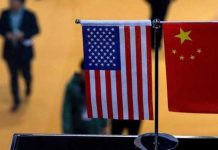By He Yin, People’s Daily
The Second Meeting of the Working Group on the Strengthening of the Biological Weapons Convention (BWC) kicked off on Aug. 7 in Geneva, Switzerland. The meeting is one of the outcomes of the Ninth BWCReview Conference held last year, and its aim is to further reinforce the effectiveness of the BWC and promote comprehensive compliance.
Biosecurity concerns the common interests of all humanity. Currently, global biosecurity governance faces both new challenges and important opportunities. On one hand, advancements in biotechnology promote productivity growth and the well-being of mankind. On the other hand, as the intension and extension of biosecurity are broadening, traditional biosecurity issues overlap with emerging biosecurity risks, making the global biosecurity landscape even more complex. How to strengthen global biosecurity governance and better balance security with development has become a common task for the international community.
Facing the new situation, challenges, and issues in the sphere of biosecurity, China adheres to systematic governance. While continuously fortifying its own biosecurity defenses, China actively participates in global biosecurity governance and makes positive contributions with Chinese wisdom and solutions.
China has solemnly put forward the Global Security Initiative and officially released the Global Security Initiative Concept Paper, calling on all nations tostay committed to maintaining security in both traditional and non-traditional domains. It encourages all countries to practice the principles of extensive consultation, joint contribution and shared benefits in global governance, and work together to address global challenges including biosecurity.
The BWC is an important cornerstone of global biosecurity governance. In over 50 years since it became open for signature, it has played a vital role in preventing biosecurity threats and promoting the peaceful use of biotechnology.
China has unequivocally advocated strengthening the BWC and vigorously promoted the establishment of a verification mechanism through multilateral negotiations to fundamentally ensure compliance.
The country has always advocated the complete prohibition and thorough destruction of all weapons of mass destruction, including biological weapons, and firmly opposes the proliferation of biological weapons and related technologies.
China is firmly committed to the BWC’s purposes and objectives, comprehensively and strictly fulfills its obligations, and actively participates in and supports multilateral processes to enhance the BWC’s effectiveness.
In April 2021, China’s Biosecurity Law formally took effect, providing a stronger legal and institutional basis for China to implement the BWC. China has also actively advocated negotiations on an international convention on the suppression of acts of bioterrorism to further address gaps in international law.
In recent years, the risks of misuse and abuse of biotechnology have attracted great attention. China supports BWC State Parties to keep pace with the times, uphold the vision of universal security and shared development for all mankind, strengthen deliberations on biotechnology development under the BWC framework, promote responsible biological research, and formulate necessary voluntary codes of conduct.
Based on this position, China engaged in in-depth discussions with various countries and reached the Tianjin Biosecurity Guidelines for Codes of Conduct for Scientists in July 2021, putting forward ten major guiding principles including ethical standards, laws and norms, responsible conduct of research, research process management, and international cooperation.
Covering the whole process and entire chain of biological research, the Tianjin Guidelines fully reflects the consensus of the international community and makes important contributions to promoting the healthy and orderly development of global biotechnology.
During the Ninth Review Conference and the Meeting of States Parties of the BWC, the Tianjin Guidelines received extensive attention and acclaim. Originating from a Chinese proposal but belonging to the whole world, the Tianjin Guidelines fully demonstrates the determination of the international scientific community to further standardize biological research activities. It also fully proves that science-based and highly representative international processes can become an effective approach to strengthening global biosecurity governance and related international cooperation.
Responding to the demands of developing countries for sharing the dividends of sci-tech development in biological and other fields, China proposed the resolution “Promoting International Cooperation on Peaceful Uses in the Context of International Security” at the United Nations General Assembly (UNGA).
This launched an open and inclusive dialogue process under the UNGA framework, which is of great significance for building a more just and reasonable export control order, safeguarding the legitimate rights and interests of all countries for the peaceful use of science and technology, and addressing the security challenges posed by sci-tech advancements.
This resolution has been adopted at the UNGA for two consecutive years and widely welcomed by the international community.
As a Chinese saying goes, “The journey ahead may be long and arduous, but with sustained actions, we will eventually reach our destination.” China will continue to uphold the banner of building a community with a shared future for mankind, promote global biosecurity governance together with the international community, and make greater contributions to achieving universal security and common development.

















